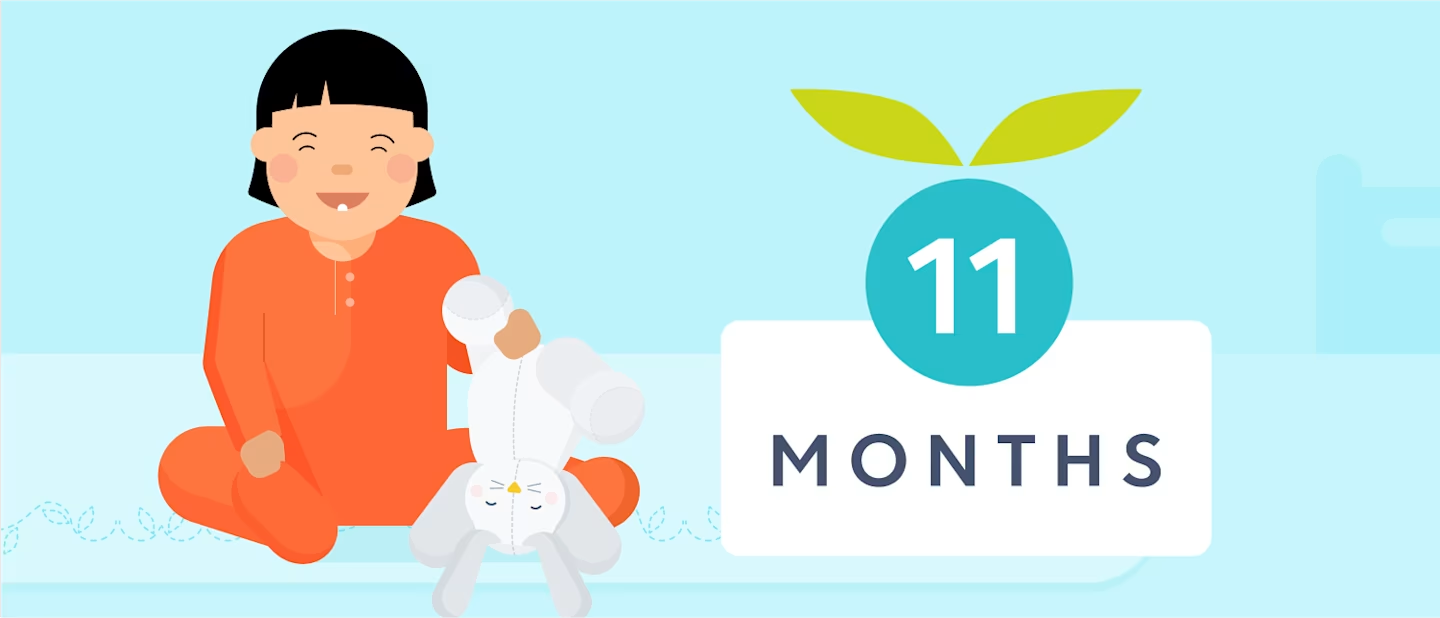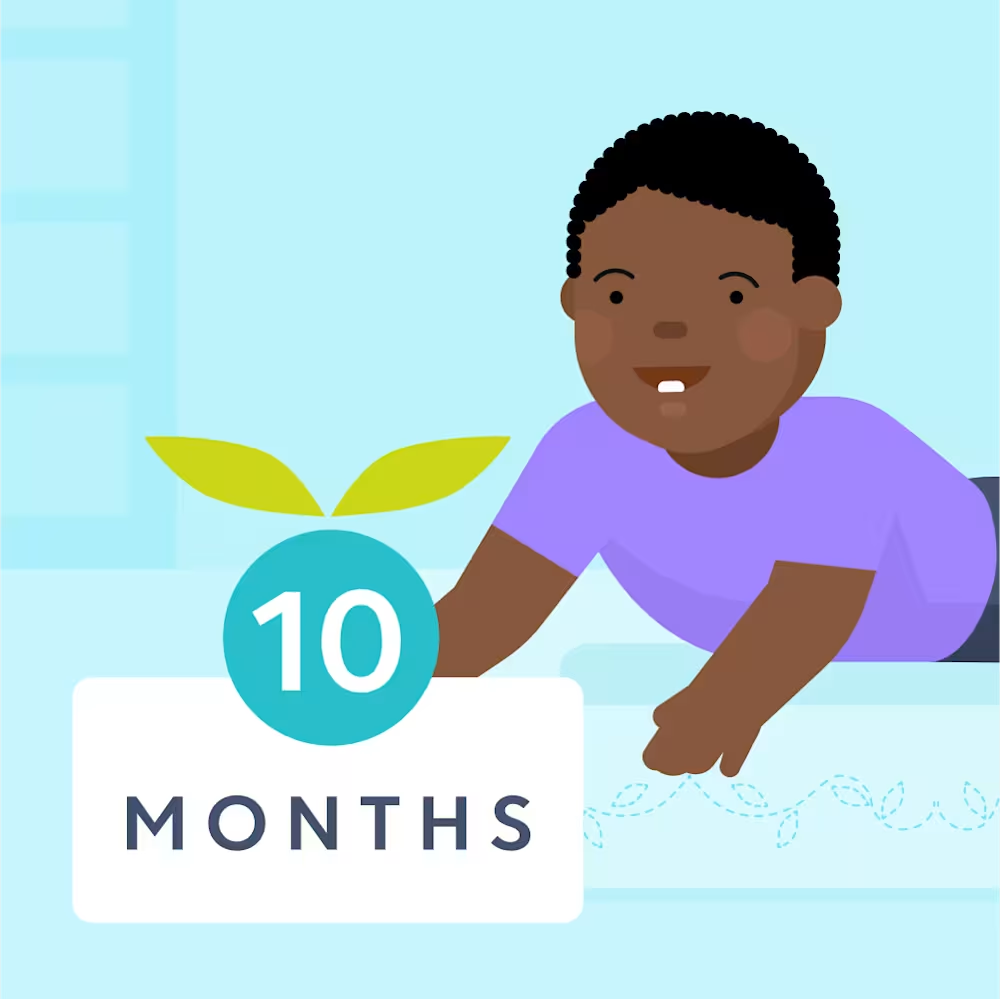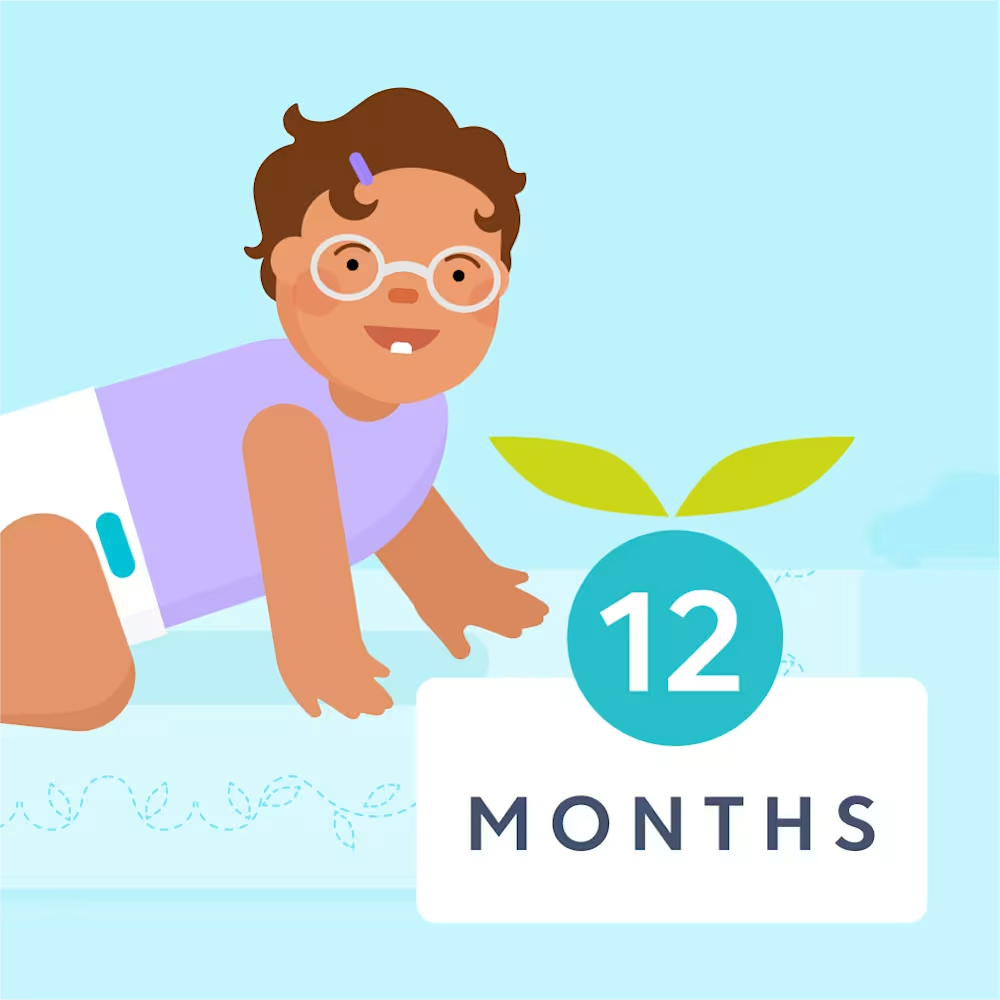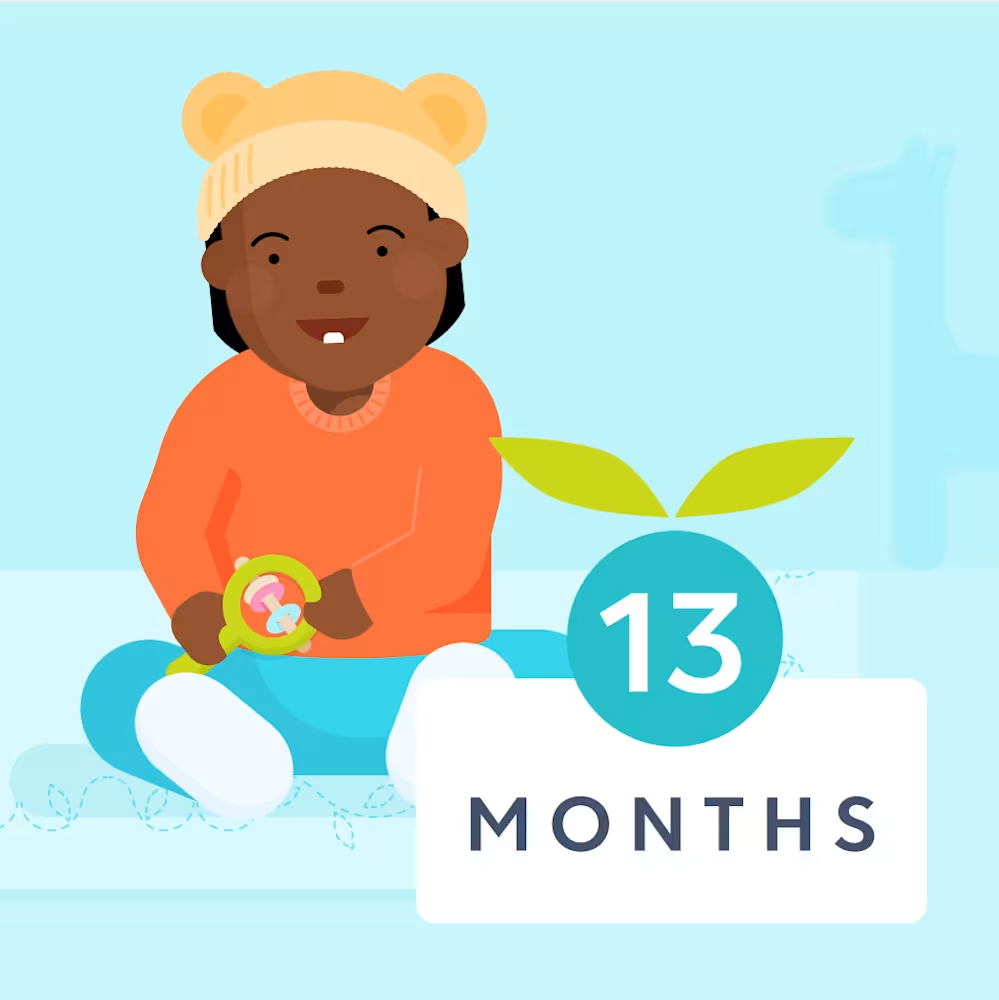11 month old sleep schedule: Bedtime and nap schedule
Updated Feb 25, 2026

Don’t be fooled by your baby’s nap resistance at 11 months old! While some parents interpret skipped naps at this age as a sign that their baby is ready to transition to 1 nap, most babies continue to need 2 naps (at least some of the time) until at least 14 months old.
In this article, we'll walk you through a sample 11 month old sleep schedule, give you advice for nap resistance, and reasons why your infant may be waking up overnight.
How much should an 11 month old sleep?
At 11 months, most babies remain well rested with around 13.5 hours of total sleep per day [] (11 - 12 hours at night and 2 - 3 hours of daytime sleep over 2 naps). Most children need about 3 - 3.75 hours of awake time between sleep periods at this age.
Sleeping is important for infant brain development [] but keep in mind that the amount of sleep needed by babies can vary quite a bit and there's a spectrum of what is considered normal and healthy. Don't stress about meeting a specific sleep goal. The recommended hours are simply a general suggestion, and it's equally important to observe your child's mood and energy levels to make sure they're getting enough rest.
Here's a quick overview of what you may expect when it comes to 11 month olds and sleep. Note that these figures are averages and should be used as guidelines.
Top sleep tip for 11 month olds
If your baby is regularly resisting naps, this may mean that they’re ready for longer periods of wakefulness. Instead of chalking up day sleep difficulties to a “nap regression” or the,” try setting a schedule that allows for wake windows that are 3.5 - 3.75 hours long. This can make it easier for your baby to fall asleep during the day.
Sample 11 month old sleep schedule

Note: Sleep needs vary by child and this chart should be viewed as an example.
Morning rise: 6:30 AM
Wake window before first nap: 3 hours
First nap: 9:30 - 10:45 AM (1.25 hour nap)
Wake window before second nap: 3.5 hours
Second nap: 2:15 - 3:45 (1.25 hour nap)
Get ready for bed: 6:30 PM
Wake window before bedtime: 3.75 hours
Asleep: 7:15 PM
Naptime schedule for 11 month old
How long should an 11 month old nap?
Most babies this age need for a total of 2 - 3 hours of daytime sleep. Each nap should be at least 60 minutes long to allow for sufficient sleep.
How many naps for an 11 month old?
Most 11 month olds take 2 naps per day. At this age we expect babies to need a nap after about 3 - 3.5 hours of awake time. Now is a good time to consider planning naps “”, meaning that naps are offered at the same time each day, even if your baby wakes a little earlier or later than usual. This approach helps regulate their internal clock, making naps and bedtime more predictable and reducing overtiredness or undertiredness.
Here’s an example schedule for this age:
2-nap schedule
Bedtime for an 11 month old
What time should an 11 month old go to bed?
A typical bedtime at this age is 12 - 13 hours after waking in the morning. For example, if your baby wakes around 6:30 AM, then you’ll want to target a 6:30 PM - 7:30 PM bedtime. If your baby resists their afternoon nap and ends up taking it later than usual, you may find that bedtime gets pushed a bit later as a result. This is typically OK as long as your little one averages at least 10 hours of sleep at night.
On the other hand, if your baby skips a nap, opt for an earlier bedtime to limit overtiredness. When little ones get too tired, this can lead to increased night waking. Early bedtime can be helpful in these instances, but we don’t recommend moving bedtime earlier than 6:00 PM, as that can lead to early rising issues.
Why does my 11 month old keep waking up at night crying?
If your 11 month old is newly waking up overnight, some contributing factors may include:
Needing a schedule adjustment
Mastering milestones
Teething or illness
Hunger
Travel
Falling asleep with assistance and desiring the same support overnight
If you’re looking for more sleep support, consider submitting for a personalized, step-by-ste Sleep Plan via .
Is there a sleep regression at 11 months old?
Sleep regressions can happen at any age. There isn’t a predetermined “” that will affect all children at this age. However, this is a common time for kids to experience new sleep challenges, often due to short wake windows, new milestones, sleep onset associations, and waking due to hunger.
Can my 11 month old sleep with a pacifier?
Pacifiers can soothe your 11 month old during sleep and awake times. Check periodically to ensure the rubber hasn’t changed color or torn over time, especially if your little one has teeth. Replace old pacifiers if you see signs of wear and tear [].
When it comes to sleep, many infants at this age are developmentally capable of replacing their pacifier if it falls out while sleeping. We suggest putting a couple in their sleep space so they can easily find one and replace it (instead of calling out for you to help) when they wake overnight.
Can I sleep train an 11 month old?
Yes, infants are usually developmentally ready for sleep training at . Sleep training is the process of teaching your little one to fall asleep on their own, usually by eliminating parent-led sleep associations (like rocking, patting, and feeding to sleep). If you decide to sleep train, there isn’t a one-size-fits-all or “right” way to do it. Instead, choose a method that fits your child’s temperament and your parenting style.
Can an 11 month old sleep on their stomach or side?
The AAP recommends placing babies under 12 months flat on their backs for sleep []. If your 11 month old rolls to their stomach or side during sleep, it’s OK to leave them in that position if they can roll both ways on their own (front to back and back to front).
What are the developmental milestones for an 11 month old?
Babies are likely working on exploring motor skills, using gestures, and comprehending words at around 11 months. Here’s what your little one may try between 11 - 12 months:
Does some version of crawling
Pulls to stand
May cruise along furniture
May take independent steps
Gets into a sitting position independently
Explores objects by banging, dropping, pushing, etc.
Uses gestures like pointing, waving, nodding
May be able to say 1 - 2 words (often “mama” and “dada”)
Follows simple directions
Does a 11 month old need to eat during the night?
At 11 months, babies can typically sleep through the night without eating. However, some may have trouble sleeping 11 - 12 hours without eating overnight. To help your little one sleep better and longer, consider offering an early morning bottle or nursing session (usually between 3:00 AM and 5:00 AM) to avoid a very early start to the day. If you have specific questions about your little one’s nutritional needs at 11 months, reach out to their pediatrician or lactation consultant for guidance.
Takeaway
Average daily sleep: At 11 months, most babies remain well rested with around 13.5 hours of total sleep per day (11 - 12 hours at night and 2 - 3 hours of daytime sleep over 2 naps).
Wake windows: Most children need about 3 - 3.75 hours of awake time between sleep periods at this age.
Nap resistance: If your baby is regularly resisting naps, this may mean that they’re ready for longer periods of wakefulness. Try setting a schedule that allows for wake windows that are 3.5 - 3.75 hours long to help your little one fall asleep more easily.
Tips for early waking: If your baby is night-weaned and in the morning, consider whether you can add more calorie-rich, nutrient-dense food during the day. Also try adding a very early morning feed (usually between 3:00 - 5:00 AM) to promote better, longer sleep.
If you're curious about what lies ahead in the coming month, glimpse into the future to see what you might experience once your baby is on a . Also check out a to see how far your little one has come.
Share article:
Note: The content on this site is for informational purposes only and should not replace medical advice from your doctor, pediatrician, or medical professional. If you have questions or concerns, you should contact a medical professional.
4 Sources
Share article:






